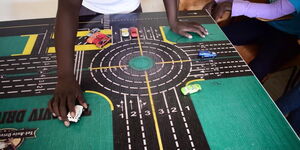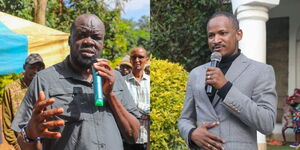In Biblical times, to feed 5,000 you needed 5 loaves of bread and two fish and you could create a miracle.
Well, Wawira Njiru has unearthed the power to feed the same 10,000 but this time with vision, resilience and a touch of the same faith still needed so long ago.
If you have not heard of her then you have heard of her work, the nutritionist is the founder of Food For Education, a non-profit that delivers affordable nutritious meals to school children.
Speaking to Kenyans.co.ke Wawira revealed her inspiration to start the much-needed feeding programme to cater to children.
"I am a nutritionist by training and so food is very close to my heart. I was learning about the impact of poor nutrition particularly on children and that’s why I started Food for Education," she begins.
"A lot of kids go to school hungry in Kenya and around the world and this affects their ability to grow and learn. I wanted to create a solution to this," she adds.
The inspiration that would ultimately carve out her path in life was sown while she was still a student of nutrition in Australia back in 2010.
When she returned to Kenya, it was her dream to use what she had learnt to uplift her community and Food For Education began right in her hometown of Ruiru.
With limited resources, Wawira began with just 25 children that she committed to feeding each day, a number that soon increased to 40 and continued on in the same vein to the 10,000 meals provided to date.
Wawira's sights are set even higher with a vision of scaling to providing one million meals in the next five years.
"We are working hard to feed 1,000,000 kids by 2025. Our vision is that no Kenyan child will have to learn while hungry and are working hard to ensure that at least 1million kids have access to nutritious meals every day," she says.
For her work, Wawira was awarded the first-ever Global Citizen Prize for Youth Leadership in 2018.
The award was given in recognition of her ambition, her simple yet powerful mission as well as proof that her feeding program had an impact on the beneficiaries.
Yet, the road has not been smooth and she has had to battle a number of challenges in her path. The biggest of this being how to account for all the children receiving meals.
"Our biggest challenge has been in creating systems and streamlining already existing systems that would allow us to scale and feed as many kids as possible at the lowest cost possible.
However, she has found a way through this hurdle by calling on the power of technology and conceptualising Tap 2 Eat wristbands.
These allow the information of the program's beneficiaries to be read using designated software. A child only has to display their band and their details will be available allowing them to eat the food provided.
"Tap2Eat wristbands and the technology behind it enable parents to save for the kids’ meals and pay the lowest cost possible for their children’s daily lunches," Wawira explains.
"By using technology such as Tap2Eat, we’ve been able to do this better and are working on stronger systems to feed 1,000,000 kids a day," she adds.
In light of the Covid-19 pandemic, Food For Education has opted to use the wristbands to provide food for vulnerable children and their families.
For most of these children, the food they get through Wawitra's program is the only stable source of nutrition they get.
Aware of this and the closure of schools, Food 4 Education decided to provide these families with food during the pandemic.
"We’re also using Tap2Eat to distribute food rations and vouchers for 6,000 families during this Covid-19 period," explains Wawira.
Wawira asserts that the Food for Education program is sustainable and the eventual target is to have the meals provided without the need for subsidies.
"Currently, parents’ contributions account for over 60% of the cost of a meal and we are also looking at leveraging on economies of scale as we continue to expand and continue to lower our cost per meal. The goal is for parents’ contribution of sh.15 to cover 100% of the cost of a meal," she explains.
Food for Education came in to fill a gap in the feeding policies at public schools.
After the government declared free primary education for all in 2003 allowing nearly 1.3 million children into the system, it did not adequately account for this influx.
The result was that many played truant on a regular basis on account of a lack of food. Wawira calls on the government to address this glaring gap.
"We would like to see policies formulated and implemented that make school feeding programs mandatory and accessible to all public primary schools. All Kenyan children deserve access to nutritious meals and none of them should learn on an empty stomach," she says.
Certainly a force in her dedication and drive, Wawira remains inspired to serve by drawing on the strength and the tenacity of her fellow citizens.
"I am inspired by Kenyans and particularly our families and kids who overcome so many hurdles to survive each day. They remind me of the resilience we as Kenyans have and how much we can do when we have systems that work for us," she concludes.












